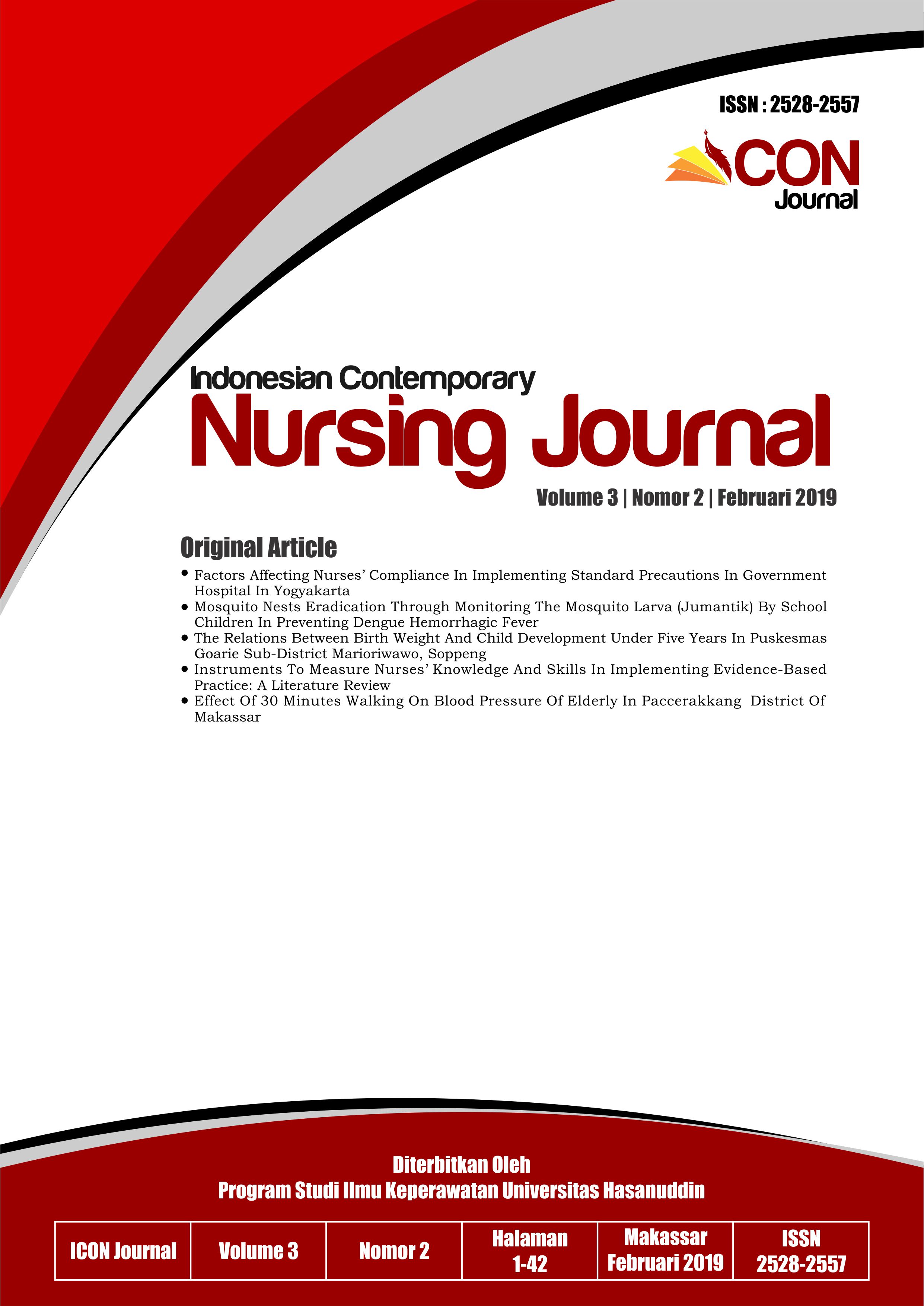Factors Affecting Nurses’ Compliance in Implementing Standard Precautions in Government Hospital in Yogyakarta
DOI:
https://doi.org/10.20956/icon.v3i2.4972Abstract
Background:Nosocomial infection is infections that occur in patients when they are hospitalized. Data in several countries found that hundreds of millions patients worldwide are exposed to nosocomial infection each year. Standard precautions are applied to prevent infections in the hospital. The results of observations and interviews on nurses at Wates Regional Public Hospital found non-compliance of nurses in implementing standard precautions.Objective:The aim of this study is to determine factors affecting nurses’ compliance in Wates Regional Public Hospital, Yogyakarta.
Method: This was cross sectional study, using questionnaire and standard precautions compliance check list. Observation was conducted twice on june 26th to July 7th, 2018. The subjects were 103 nurses in 10 inpatients room, taken by total sampling. Data was analyzed by pearson, spearman and mann whitney u test as bivariate, and also linier regression as multivariate.
Result:The result of this study indicate that there were significant relationship between gender, standard precautions knowledge, motivation and work experience with nurses’ (p < 0,05), while there were insignificant relationship between age, education level, attitude, risk perception, preventive efficacy, risk taking personality, needle punctured experience, workload, infection knowledge, work stress, obstacles in standard precautions, the availability of personal protective equipment, safety climate and safety performance feedback with nurses’ compliance (p > 0.05). Multivariate test indicate that motivation has a dominant influence on nurses’ compliance.
Conclusion and Suggestion: Factors influencing nurse compliance with standard precautions include motivation, work experience and risk taking personality. The dominant factor influencing nurse compliance with standard precautions is motivation. Suggestions from this study are to improve the completeness of facilities and tools related to standard precautions, monitoring and evaluation of nurses’ compliance. Further study needs to be held related to standard precautions each component include hand washing, personal protective equipment usage, care equipment decontamination, safe injecting practices, sharp objects and waste management.
Key words:nosocomial infection, compliance to standard precaution, Wates Regional Public Hospital
1: Wates Regional Public Hospital
2: Master in Nursing, Faculty of Medicine, Public Health and Nursing UGM
References
Burton, Kelli. (2012). A study of motivation: how to get your employees moving. Thesis: Indiana University.
Cates, C. (2011). Cooperative education and internship. International Journal Work Integrated Learning, 45(02): 123-126.
Darmadi. (2008). Infeksi Nosokomial: Problematika dan Pengendaliannya. Jakarta: Salemba Medika.
Dejoy, D.M., Searcy, CA., Murphy, LR., Gershon, RR. (2000). Behavioral diagnostic analysis of compliane with universal precautions among nurse. Journal of Occupational Health Psychology, 1(5):127-141.
Depkes RI. (2008). Pedoman Pencegahan dan Pengendalian Infeksi di Rumah Sakit dan Fasilitas Pelayanan Kesehatan Lainnya: Kesiapan Menghadapi Emerging Infectious Disease Cetakan kedua. Jakarta.
Ganta, VC. (2014). Motivation in the workplace to improve the employee performance. International Journal of Engineering Technology, Management and Applied Sciences 2(6): 221-230.
Gershon, Robyn R.M et al. (1995). Compliance with universal precautions among health care workers at three regional hospital. AJIC Am J Infect Control, 23: 225-236.
Khan, H.A.; Baig, F.K.; Mehboob, R. (2017). Nosocomial infection: epidemiology, prevention, control and surveillance. Asian Pasific Journal of Tropical Biomedicine, 7(5), 476-482.
Kusworo, W.S. (2014). Hubungan motivasi dengan penerapan universal precaution di bangsal bedah dan penyakit dalam kelas 3 RSUD Muntilan Kabupaten Magelang. Skripsi: Stikes Aisyiah Yogyakarta.
Luo, Yang., He, Guo Ping., Zhou, Jijan Wei., Luo, Ying. (2010). Factors impacting compliance with standar precautions in nursing Cina. International Journal of Infectious Disease, 14:1106-1114.
McGovern, PM; Vesley, Donal; Kochevar, Laura; Gershon, RR. (2000). Factor affecting universal precautions compliance. Journal of Business and Psychology, 15(1): 149-161.
Raka, L and Osmani, G.M. (2012). Infection Control in Developing World. www.cdn.intechopen.
Riniwati, Harsuko. (2016). Manajemen Sumberdaya Manusia: Aktivitas Utama dan Pengembangan SDM. Malang: UB Press.
Rook, Steve. (2016). Work Experience, lacements and Interships. London: Palgrave.
Runtu, L.G. (2012). Faktor-faktor yang berhubungan dengan perilaku perawat dalam penerapan universal precautions di RSUP.Prof.Dr.D.Kandau, Manado. Tesis: Universitas Gadjah Mada. infolib.med.ugm.
Sahara, A. (2011). Faktor-faktor Yang berhubungan dengan kepatuhan perawat dan bidan dalam kewaspadaan universal/kewaspadaan standar di Rumah Sakit Palang Merah Indonesia (PMI) Bogor tahun 2011. Skripsi: Universitas Indonesia. lib.ui.ac.id.
Sarani, Hamed; Balochi, Abbas; Masinaeninezhad, Nosratollah; Ebrabimitabs, Ebrahim. (2016). Knowledge, attitude and practice of nurses about standard precautions for hospital acquired infection in teaching hospitals affilated to Zabol University of Medical Sciences. Global Journal of Health Science, 8 (3).
Saxena, Nidhi. (2013). Relationship between risk taking behavior, personality, and sensation seeking tendencies among NCC cadets. IOSR Journal of Humanities and Social Science, 18(3): 01-06.
Sihono. (2012). Hubungan pengetahuan dan sikap dengan perilaku tentang kewaspadan standar pada perawat di ruang rawat inap RSUD Panembahan Senopati Bantul. Skripsi: Stikes A Yani Yogyakarta.
Sumariyem, Quirina. (2015). Hubungan motivasi dengan kepatuhan perawat dalam praktik hand hygiene di ruang Cendana IRNA I RSUP Dr. Sardjito Yogyakarta. Skripsi: Stikes Aisyiah Yogyakarta.
WHO. (2018). Health Care Associated Infections Fact Sheet. www.who.int/gpsc/country/gpsc_ccisc_fact_sheet_en.pdf
Downloads
Published
How to Cite
Issue
Section
License
Authors who publish with this journal agree to the following terms:Authors retain copyright and grant the journal right of first publication with the work simultaneously licensed under a Creative Commons Attribution License that allows others to share the work with an acknowledgement of the work's authorship and initial publication in this journal.
Authors are able to enter into separate, additional contractual arrangements for the non-exclusive distribution of the journal's published version of the work (e.g., post it to an institutional repository or publish it in a book), with an acknowledgement of its initial publication in this journal.
Authors are permitted and encouraged to post their work online (e.g., in institutional repositories or on their website) prior to and during the submission process, as it can lead to productive exchanges, as well as earlier and greater citation of published work (See The Effect of Open Access).



